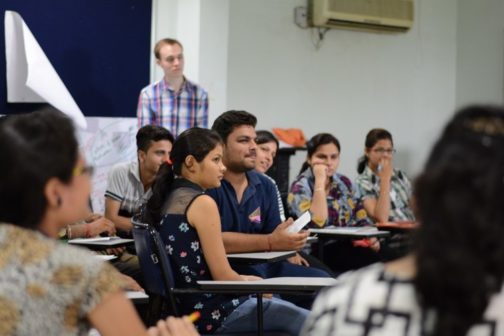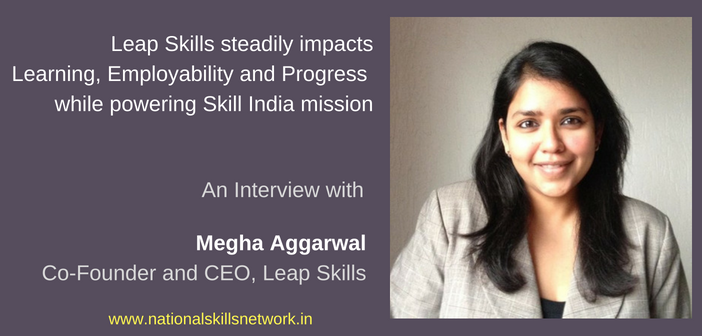A promising startup in the skills space, steadily impacting employability and employment through skill-based training, Leap Skills has been contributing to Skill India mission in many ways. We caught up with Megha Aggarwal, Co-Founder and CEO, Leap Skills, to capture their Skill Story and learn about their engagements, achievements and upcoming plans to scale and sustain in the emerging skills ecosystem in India. Here’s the interview with Megha capturing her professional journey, crossing many milestones.
Q: Tell us about the inspiration to start Leap Skills and how you are connecting Learning, Employability and Progress through your programs?
A: Coming from a family which has always been invested in the education sector, I was mindful of the fact that access to good education was unfortunately dependent on socio-economic factors instead of students’ desire to learn. In 2009, I decided to leave my job at Morgan Stanley, New York and come to India to work as a researcher in the education sector, where I witnessed the struggles first-hand. What really shook me to my core was how little teachers in schools in rural India cared about the quality of education they delivered.
I remember the moment that motivated me to start Leap—I was working as a researcher in the Sirohi district of Rajasthan wherein we were assessing the aspiration levels of students in schools. During a visit to a government school, I asked a teacher questions regarding students, teaching quality, resources, etc. Instead of answering my questions, he told me to pack my bags and go back to New York because his students were not worthy of being helped and my work was a waste of time. That interaction helped me experience the need to fight for the students who lack support not just in terms of material resources, but also in terms of guidance and encouragement. They do not have the awareness to fight for themselves and that is exactly why organizations such as Leap are required to teach these students grit, resilience, and audacity.
We established Leap with the idea of empowering youth and exposing them to real-world conditions through unconventional classroom methods. We wanted our students to gain skills that are of value in the market and are sought after by employers. This required us to combine in-class activities adapted to various workplace situations with innovative online learning mechanisms.
Q: How is Leap skills contributing to Skill India mission, what is your experience of implementing initiatives like RPL, other government schemes?
 A: The Skill India Mission by NSDC aims to upskill the Indian youth to ensure they become drivers of India’s growth. Leap Skills is contributing to this mission by generating awareness, delivering high-quality skilling programs, and enabling access to aspirational jobs. We collaborated with the NSDC to conduct Recognition of Prior Learning Program under PMKVY. As an RPL implementer, Leap Skills trained 22,000+ minimum-wage workers in the hospitality sector. More than 16,000 of these trainees were certified for successful completion of the course. Staff from across over 200 companies such as Google, Paytm, and Deloitte participated in our programs. We have also collaborated with the state governments of Haryana and Rajasthan to roll out our market-based communications course—Propeller, across ITIs and Government Polytechnics. We have received the final approval from the Rajasthan Government for executing the DDU-GKY scheme for 300 students in the state.
A: The Skill India Mission by NSDC aims to upskill the Indian youth to ensure they become drivers of India’s growth. Leap Skills is contributing to this mission by generating awareness, delivering high-quality skilling programs, and enabling access to aspirational jobs. We collaborated with the NSDC to conduct Recognition of Prior Learning Program under PMKVY. As an RPL implementer, Leap Skills trained 22,000+ minimum-wage workers in the hospitality sector. More than 16,000 of these trainees were certified for successful completion of the course. Staff from across over 200 companies such as Google, Paytm, and Deloitte participated in our programs. We have also collaborated with the state governments of Haryana and Rajasthan to roll out our market-based communications course—Propeller, across ITIs and Government Polytechnics. We have received the final approval from the Rajasthan Government for executing the DDU-GKY scheme for 300 students in the state.
Every time I attend an RPL certification ceremony, I witness a palpable sense of achievement. The job roles that minimal-wage earners usually get trained for are not highly aspirational. However, the certification gives our trainees a sense of pride as the ceremonies are attended by seniors at the company who hand out certificates and deliver motivational speeches. All these small measures attach a sense of dignity to the work of our trainees—they feel respected as members of the staff.

Q: What is the impact of Leap Skills in the state you operate; how have the programs changed the lives of beneficiaries.
A: A lot of our impact is concentrated in underserved institutions in Haryana. We have trained over 7000+ students in the state including a significant proportion of women. We also actively work in states such as Rajasthan, Uttar Pradesh, and Delhi. In Rajasthan we collaborated with the state government and our CSR Partners, Oak Foundation, to train 320+ students across three ITIs and one Government Polytechnic. About 34% of these trainees belonged to rural households and 73% of them were first-generation college goers. In Kanpur, with the support of our CSR Partner, Lohia Group, we delivered Propeller to 250+ polytechnic students.
More than basic employability skills, our students lack the opportunity to dream big and be audacious. Our course helps them identify aspirational career opportunities and achieve the same with confidence. A recent instance that made me proud was to see two of our alumni apply to Leap for the position of an English language trainer. This shows the powerful relationship between Leap and its students.
A video that captures the story of one of our strongest and most independent student, Nisha:
Q: What are some of the challenges that you have faced especially in the vocational education space?
A: The greatest challenge I faced was the mindset issue—I remember sitting for hours outside principals’ offices even after taking appointments because they did not think my work or efforts were of any value. There exist so many pre-set notions about which jobs one should do that students do not get exposed to the vast range of opportunities that are present today. Even educators and parents are not in sync with market demands and are wary of unconventional courses. Once, I even received a call from a very disgruntled parent asking me not to admit her child for the Leap course, even though the child herself was keen on attending the classes.
The second challenge we faced was low uptake of our market-based solutions due to a strong focus on government jobs and the prevalence of sub-par free government schemes with no tangible outcomes that have soured students’ expectations towards skilling programs.
The third challenge was to strike a balance between building a sustainable business model and delivering high-quality outcomes at scale. In 2016, we hit a serious slump. The market was unresponsive and there was a general sense of dismay.
Year 2017-2018 was our comeback year as we increased our reach to 30,000 individuals (vs. roughly 3000 in all prior years combined!), our blended learning program won MIT’s Inclusive Innovation Challenge, and we finished the financial year with a positive bottom line.
Q: How do you monitor already placed students and help them grown in their career? How do you establish and maintain connect with the industry?
A: One of the things that makes the training and the trainers at Leap stand out is the deep bonds they make with the students. Even after getting placed, many students have reached out to us for guidance regarding career decisions. At each promotion, our students remember us and share their happiness with us. We keep our alumni engaged through social media and WhatsApp groups and we have an impact framework in place which we use to track student career growth, achievements, and difficulties over a course of time.
Leap maintains a strong foothold in the circles of thought leaders through participation in international forums like the Atlantic Dialogues, the Zurich Social Investment Breakfast Club, and MIT’s Inclusive Innovation Challenge, which help us stay in touch with emerging industry trends. Moreover, our sales team is always in touch with our industry partners and employers to understand their needs so that we can develop more focused programs. This in turn becomes fruitful for our students and helps us place them in aspirational roles. This is why we have been able to achieve an 87% successful placement rate. By establishing an internal SPOC for every industry-stakeholder, we are able to create a transparent accountability system with our stakeholders and helps us remain updated on industry insights.
Q: What are your upcoming goals and plans for the next 5 years in the area of enhancing youth employability?
A: Over the next 5 years Leap plans to identify and develop markets for Propeller, our flagship communication course, and to establish sector-specific training modules. We will take a demand-led approach under which we will identify employers with manpower needs and then train students and place them according to employer mandates.
We are also committed to working towards increasing parent interaction and to collaborate with union and state governments to integrate our training programs into their curricula. This step will go a long way in bringing about a change in the level of awareness and access of some underserved communities.
Leap already has a strong presence in the North. We now plan to expand into other geographies and deepen our reach. We recently launched our own open-market training centre in Jaipur. This project has been quite exciting because it is our first attempt at sourcing students through B2C channels. We are also expanding our B2B partnerships like our work with Wadhwani Foundation, Michael and Susan Dell Foundation, and Deshpande Foundation.
Q: What advice would you like to share with people working in the skill based training space?
My first and foremost advice is to understand the aspirations of students. Assess their awareness levels and create interventions that help them expand their understanding of the vast array of opportunities that the market has to offer. Secondly, have a demand-led approach which will help you marry your training curriculum with the available job prospects. Thirdly, don’t be too attached to your business model but do stay committed to your problem statement.
Always monitor your impact closely—it is essential to collect robust data because that will provide you with key strategy insights. Be innovative and use technology as an amplifier. Our tech-based solution has aided us in making our programs approachable at affordable prices and achieve a balance between cost, quality, and scale. The most important advice is to always watch your bottom-line. Don’t bite more than you can chew and save yourself financial stress.
My last advice is to develop thick skin and learn to be resilient. It is always important to remember the importance of the fight we are all a part of. Fail quick and fail often, but never give up.












